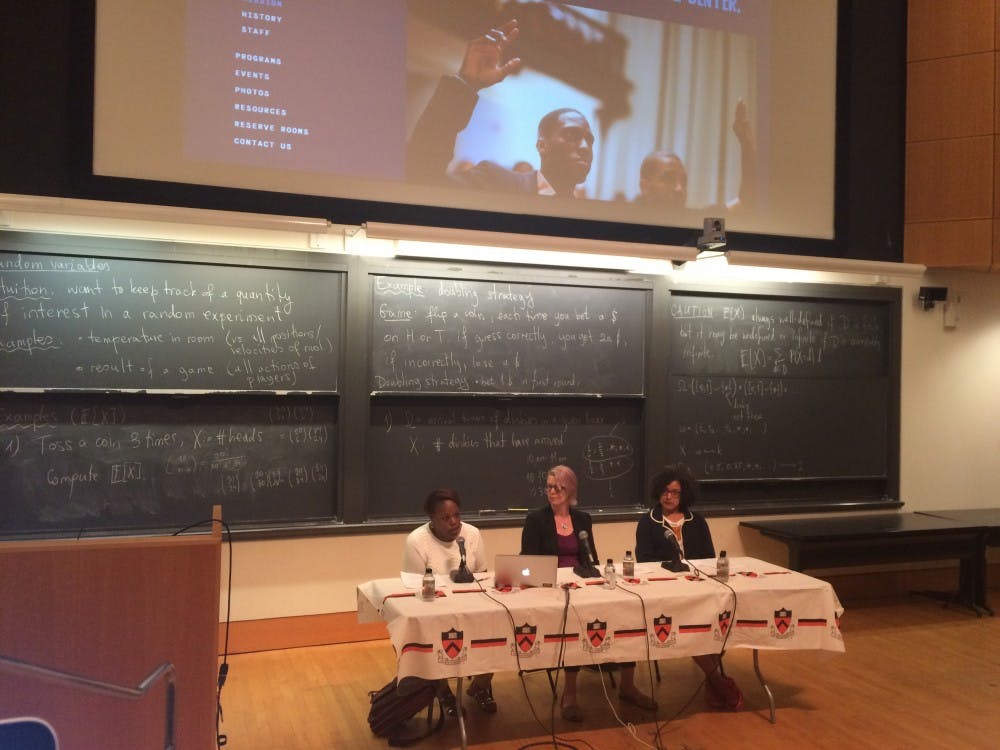Divestment from private prisons and upcoming programming by campus resource centers were the two main topics discussed at the first Council of the Princeton University Community meeting of the 2017-2018 academic year this Monday.
The meeting began with a brief question-and-answer period moderated by University President Christopher Eisgruber ‘83. To kick off this discussion stream, a student from Puerto Rico asked how Counseling and Psychological Services and other campus resources have undertaken outreach to students impacted by Hurricane Maria and other recent natural disasters.
Vice President for Campus Life W. Rochelle Calhoun explained that the Office of the Dean of Undergraduate Students [ODUS] coordinates through the DSLs [Directors of Student Life] in all of the colleges to reach out to students who were in any affected areas. She noted that the colleges are currently working to finish outreach to all affected students.
Another student asked about the status of the University’s plan to incorporate Latino Studies and Asian American Studies into the American Studies department.
Dean of the College Jill Dolan noted her office is currently working with Professor Hendrik Hartog of the Department of History and Professor Anne Chen '85 of the Department of English to revitalize the American Studies curriculum to incorporate Latino Studies as well as Asian American Studies in the hopes of creating certificate and concentration programs.
The meeting then shifted to focus on the committee's review of last year's proposal by campus group Princeton Private Prison Divest (PPPD), which called for “divestment from corporations that run and contract exclusively with private prisons.”Schoene explained that, since the committee was unable to come to a resolution on the proposal last fall, the committee is taking the proposal's review up again this fall as its primary topic of discussion.
“Other things on the table include the committee’s website and potentially other forms of better communicating the committee’s actions or discussions to the community and getting feedback from the community as well,” Schoene added.
“At [the March CPUC] meeting, we heard that Princeton is not currently invested in any private prison industry, so therefore any decision or recommendation made by this committee to the Board of Trustees would be to put up some sort of block against [investment] and the details of that don’t really exist yet,” Schoene responded.
A member of the PPPD asked if the committee would provide more specific feedback for the PPPD proposal, stating that in the past year the group had received only general advice.
Schoene stated that the committee had sent PPPD a summary letter in the spring with more specific comments.
“We’re trying to open that line of communication between [PPPD] and the committee,” Schoene responded.
The second half of the CPUC meeting consisted of a panel with Director of the Carl A. Fields Center for Equality and Understanding Tennille Haynes, Director of the LGBT Center Judy Jarvis, and Director of the Women*s Center Amada Sandoval.

The panel was introduced by Dean of Diversity and Inclusion LaTanya Buck.
“We had the opportunity this past academic year to work on three-year strategic plans [for each of the centers],” Buck said. “The strategic plans focus specifically around student support and engagement, collaborative partnerships, service to campus partners and stakeholders and also community building.”
Haynes began the panel by describing the Carl A. Fields Center, named in honor of the first African American administrator at Princeton and in the Ivy League.
Haynes discussed the Heritage Month events which the Fields Center sponsors, such as the currently ongoing Latinx Heritage Month and the Native American Heritage Month in November.
“It’s important to note that all of the Heritage events we do are created and hosted in collaboration with the Fields Center but also with cultural student groups,” Haynes added.
The Fields Center also sponsors mentoring programs such as Princeton University Mentoring Program (PUMP), which pairs first-year students with upperclassmen.
Jarvis then introduced the mission and initiatives of the LGBT center.
Jarvis highlighted two initiatives the LGBT center is sponsoring this fall. The first is a system of peer educators who sponsor panels in the residential colleges for first-year students in the fall, followed by workshops in the spring that are tailored to specific groups, such as the Peer Health Advisors in the residential colleges.
“What I love about our peer ed program and one of the reasons I think it has existed for so long, longer than there has been an LGBT Center here, is that it uses personal storytelling as a key teaching tool,” Jarvis explained. “I think that makes the peer educators come back and I think it also impacts first-year students in a different way than a PowerPoint or a glossary.”
The LGBT Center also sponsors a mentorship program, Q’nnections, which consists of groups of six to eight undergraduates, graduate students, faculty and staff who meet for dinners and other events.
Sandoval then spoke to the objectives of the Women*s Center.
“Everyone’s lives are affected by gender and we encourage students to explore and acknowledge [and] become familiar with the way gender is implicating them and affecting how they live their lives and the decisions they’re making,” Sandoval said.
The CPUC meeting was held on Sep. 25 at 4:30 p.m. in Friend Center 101. The next meeting will be Monday, Nov. 13.





